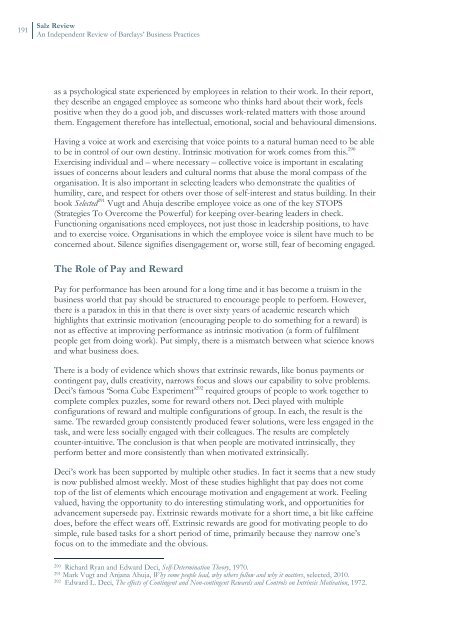Salz Review - Wall Street Journal
Salz Review - Wall Street Journal
Salz Review - Wall Street Journal
Create successful ePaper yourself
Turn your PDF publications into a flip-book with our unique Google optimized e-Paper software.
191<br />
<strong>Salz</strong> <strong>Review</strong><br />
An Independent <strong>Review</strong> of Barclays’ Business Practices<br />
as a psychological state experienced by employees in relation to their work. In their report,<br />
they describe an engaged employee as someone who thinks hard about their work, feels<br />
positive when they do a good job, and discusses work-related matters with those around<br />
them. Engagement therefore has intellectual, emotional, social and behavioural dimensions.<br />
Having a voice at work and exercising that voice points to a natural human need to be able<br />
to be in control of our own destiny. Intrinsic motivation for work comes from this. 290<br />
Exercising individual and – where necessary – collective voice is important in escalating<br />
issues of concerns about leaders and cultural norms that abuse the moral compass of the<br />
organisation. It is also important in selecting leaders who demonstrate the qualities of<br />
humility, care, and respect for others over those of self-interest and status building. In their<br />
book Selected 291 Vugt and Ahuja describe employee voice as one of the key STOPS<br />
(Strategies To Overcome the Powerful) for keeping over-bearing leaders in check.<br />
Functioning organisations need employees, not just those in leadership positions, to have<br />
and to exercise voice. Organisations in which the employee voice is silent have much to be<br />
concerned about. Silence signifies disengagement or, worse still, fear of becoming engaged.<br />
The Role of Pay and Reward<br />
Pay for performance has been around for a long time and it has become a truism in the<br />
business world that pay should be structured to encourage people to perform. However,<br />
there is a paradox in this in that there is over sixty years of academic research which<br />
highlights that extrinsic motivation (encouraging people to do something for a reward) is<br />
not as effective at improving performance as intrinsic motivation (a form of fulfilment<br />
people get from doing work). Put simply, there is a mismatch between what science knows<br />
and what business does.<br />
There is a body of evidence which shows that extrinsic rewards, like bonus payments or<br />
contingent pay, dulls creativity, narrows focus and slows our capability to solve problems.<br />
Deci’s famous ‘Soma Cube Experiment’ 292 required groups of people to work together to<br />
complete complex puzzles, some for reward others not. Deci played with multiple<br />
configurations of reward and multiple configurations of group. In each, the result is the<br />
same. The rewarded group consistently produced fewer solutions, were less engaged in the<br />
task, and were less socially engaged with their colleagues. The results are completely<br />
counter-intuitive. The conclusion is that when people are motivated intrinsically, they<br />
perform better and more consistently than when motivated extrinsically.<br />
Deci’s work has been supported by multiple other studies. In fact it seems that a new study<br />
is now published almost weekly. Most of these studies highlight that pay does not come<br />
top of the list of elements which encourage motivation and engagement at work. Feeling<br />
valued, having the opportunity to do interesting stimulating work, and opportunities for<br />
advancement supersede pay. Extrinsic rewards motivate for a short time, a bit like caffeine<br />
does, before the effect wears off. Extrinsic rewards are good for motivating people to do<br />
simple, rule based tasks for a short period of time, primarily because they narrow one’s<br />
focus on to the immediate and the obvious.<br />
290 Richard Ryan and Edward Deci, Self-Determination Theory, 1970.<br />
291 Mark Vugt and Anjana Ahuja, Why some people lead, why others follow and why it matters, selected, 2010.<br />
292 Edward L. Deci, The effects of Contingent and Non-contingent Rewards and Controls on Intrinsic Motivation, 1972.
















